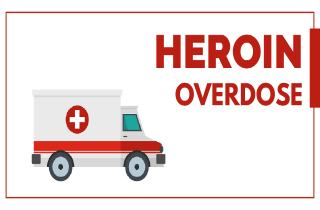Yes, it is possible to overdose on heroin.
Heroin is a poisonous illicit drug with a strong effect over your mind and body. People use heroin because of the pleasurable “high” that it produces. But in case of an OD, you get extremely sleepy, or may become unconsciousness and stop breathing.
What are the risks of a heroin overdose? And, what can you do in case of an OD? This article provides you with information about the risk factors for heroin overdose. Then, we welcome your questions in the comments section at the end.
Can you overdose on heroin?
Yes.
Overdose on heroin is a real risk for anyone who abuses heroin. Most commonly, people who have become addicted to heroin are those that overdose; they may be adjusting for a high tolerance to opiates and take too much heroin. Those who overdose can also OD after using a more pure quality grade of heroin than expected. Still, even individuals who try heroin for the first time can also be exposed to the risk of overdose.
What happens you overdose on heroin?
Overdose can be described as a dangerous and toxic level of heroin in the body. When you take a large amount of heroin or a highly pure form of it, your heart rate and respiration drop to the point were you can’t survive without medical help. The inability to breathe usually affects the amount of oxygen that reaches the brain. The condition during which there is not enough oxygen getting to the brain is called, “hypoxia”. Hypoxia has short-term and long-term psychological and neurological effects, including coma and permanent brain damage.
Heroin overdose affects every organ of your body in a different way. For example:
- Your breathing may get slow and difficult, or you may stop breathing completely.
- The eyes become extremely small, the mouth dries and the color of your tongue changes.
- Your blood pressure drops drastically and you have a weak pulse.
- The skin, nails and lips become bluish-colored.
- You may also fall into coma, or delirium.
- You may feel disoriented and experience uncontrolled muscle movements.
How much heroin is too much?
Death from heroin overdose can happen anywhere from several minutes to several hours after ingestion. But how much heroin is too much? According to some sources, the lethal dose for a heroin intolerant person can range from 200 mg to 500 mg. Addicts, on the other hand, can tolerate doses as high as 1800 mg without even being sick.
However, illicit heroin, sold on the street under the names “junk”, “smack” or “skag” has an unpredictable purity. The average purity of street heroin varies from 11% – 72% depending on the demographic region. This variation can lead to overdose when users prepare what they consider to be a moderate dose, while actually taking far more than intended.
Tolerance typically decreases after a period of abstinence. In case this occurs and the user takes a dose comparable to previous usual doses, s/he may experience more potent effects than expected. Relapsing on heroin after a period of abstinence can potentially result in dangerous heroin overdose.
Heroin overdose help
In case you are in the presence of an individual that has OD on heroin you should always call 911 ASAP or administer home based doses of naloxone. When working with emergency hotline, be sure that you can provide info about:
- The age, weight and condition of the individual
- The amount of heroin the individual took
- The specific time the individual last took heroin
You can also call The National Poison Control Center hotline on 1-800-222-1222. This number is confidential, free-of-charge and is available 24/7. By calling, you will get in touch with a poison expert,which will give you further instructions about what you need to do.
When the ambulance takes the person with heroin overdose to the emergency room the first thing the provider usually measures and monitors the person’s vital signs, including:
- body temperature
- blood pressure
- pulse
- respiration rate
All of these symptoms will be treated accordingly, and the person with a heroin overdose will likely receive:
- Breathing support
- Chest x-ray
- CT scan of the brain in case of head injury
- EKG (electrocardiogram, or heart tracing)
- Intravenous fluids
- Medicines to treat symptoms such as: buprenorphine, methadone and naloxone
- Testing samples of blood and urine
Overdose on heroin questions
In case you still have questions about the dangers of heroin overdose, please leave them here. We are happy to answer your questions and will try to respond personally and promptly to all legitimate inquiries.
Reference Sources: Medline Plus: Heroin overdose
NIH: Heroin: What can be done for heroin overdose
NIH: Heroin









Related Posts